Expert Ecommerce PPC Services: Outsmart Bloated Agencies, Maximize Your ROI
- Chase McGowan

- Oct 28, 2025
- 16 min read
Ecommerce PPC services are about one thing: driving immediate, profitable traffic to your online store. While SEO is a long game, a meticulously managed pay-per-click campaign puts your products in front of customers who are ready to buy right now. It's the fastest path to measurable sales, but only if it's run by a specialist who treats your ad spend like their own—not a junior account manager at a bloated agency.
Why Specialized Ecommerce PPC Services Matter Now
In today’s crowded market, just running a few ads is like shouting into a hurricane. You might make some noise, but you’re not going to get the attention of the right people. This is where the sharp, strategic edge of specialized ecommerce PPC services makes all the difference.
It’s not just about buying clicks. It’s about building a direct, profitable path from a customer’s search query straight to your checkout page.
The gap between a generic, over-priced agency and a true specialist is massive. Too many businesses get stuck with large firms that treat their account like just another number on a spreadsheet. They use tired templates, hand your critical campaigns off to a junior employee, and bill you for their huge overhead. The result? Wasted ad spend and a ton of missed opportunities.
The Consultant Advantage
An independent, expert consultant works on a totally different wavelength. My goal isn't to juggle a huge client list; it's to get deeply invested in your business and your bottom line. Think of it as hiring a master craftsman instead of getting something off a factory assembly line.
This partnership gives you a few key advantages:
Direct Expertise: You talk directly to me, the person actually running your campaigns. No layers of account managers slowing things down.
Customized Strategy: Your campaigns are built from the ground up around your unique brand, products, and profit margins—not shoved into a one-size-fits-all box.
Agility and Speed: As a dedicated expert, I can pivot on a dime based on real-time data, jumping on new trends and killing underperforming ads before they drain your budget.
A specialist’s true value is their ability to blend deep platform knowledge with a real understanding of your business goals. I manage your ad spend like it’s my own, focusing on profitability, not vanity metrics.
Ultimately, this focused approach ensures every dollar you spend is working to generate real revenue. To see how PPC fits into a bigger picture focused on measurable results, it's worth exploring the world of ecommerce performance marketing.
Choosing the right partner means you're investing in expertise, not execution. For ambitious ecommerce brands, that single distinction is what fuels sustainable growth.
The Agency Bloat vs The Consultant Advantage
Picking a partner to run your e-commerce PPC is a massive decision, but too many business owners end up comparing apples to oranges. In one corner, you have the big, traditional marketing agency. In the other, the independent, specialized consultant. Both will promise you the world, but the day-to-day experience—and the results—are worlds apart.
The typical large agency model is weighed down by "agency bloat." This isn’t just about the higher price tag; it's about the layers of inefficiency that can completely suffocate your campaign's growth. Your account gets bounced around a chain of command, from a senior person you met once during the sales pitch to a junior account manager who's actually clicking the buttons. This structure is a recipe for communication gaps, a total lack of personal investment, and cookie-cutter strategies.
You’re not just paying for expertise. You're paying for their high-rise office, their bloated sales team, and their layers of management.
The Problem with the Assembly Line Approach
Think of a big agency like a factory assembly line. Each client’s campaign rolls down the conveyor belt, getting a standard part bolted on at each station. The entire process is built for volume, not for nuance. This one-size-fits-all approach is a death sentence for ambitious e-commerce brands because it ignores the very things that make you unique: your specific profit margins, your ideal customer, and your position in the market.
Have a question? Need to make a quick strategic pivot? Your request has to travel up the chain of command and back down again. By the time an answer comes, the market opportunity has probably vanished.
One of the biggest frustrations business owners face with large agencies is the huge disconnect between the strategist who sold them the dream and the junior employee who actually does the work. This gap leads to wasted ad spend, missed opportunities, and a strategy that never quite clicks with the business's real goals.
This model is built to make the agency scalable, not to make your business profitable. You deserve a partner who is as nimble and focused as you are.
Direct Access to Dedicated Expertise
Working with an independent PPC consultant like me completely flips the script. The person you hire is the person doing the work. No layers, no middlemen, no frustrating games of telephone. You get a direct line to the expert, and that translates into some serious advantages for your e--commerce store.
Unmatched Speed and Agility: When the data shows a new opportunity or a looming problem, I can act on it immediately. There’s no waiting for an internal meeting or getting a manager’s sign-off. This speed is a massive competitive edge.
Deeply Customized Strategy: As your consultant, I take the time to get inside your business. I learn your products, your margins, and your real goals to build a PPC strategy from the ground up that’s designed for you.
Total Transparency: With me, you know exactly what your money is paying for—my time, my expertise, and my strategic brainpower. The pricing is simple, and the reporting focuses on metrics that actually matter to your bottom line, like Return on Ad Spend (ROAS) and Customer Acquisition Cost (CAC).
This visualization shows how specialized PPC becomes a true growth engine, directly fueling sales, customer acquisition, and brand visibility when an expert is at the helm.
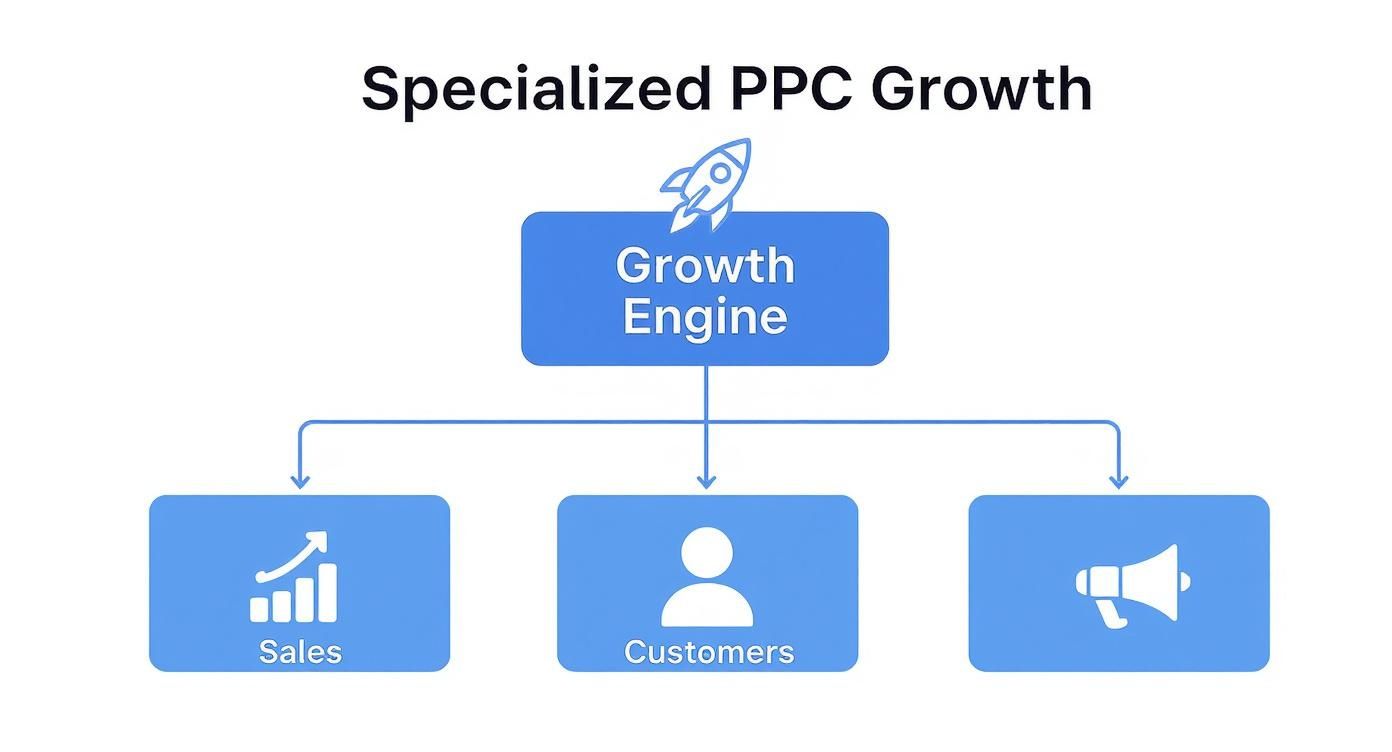
The hierarchy is clear: when a specialist manages your campaigns, the outcome isn't just clicks—it's real, tangible business growth.
An Investment in Results, Not Overhead
When you're comparing a large agency to a focused consultant, it helps to see the differences side-by-side.
Agency vs Consultant: A Head-to-Head Comparison
Feature | Large PPC Agency | Independent PPC Consultant |
|---|---|---|
Point of Contact | Junior Account Manager | The Expert You Hired |
Strategy | Templated, "One-Size-Fits-All" | Fully Customized to Your Business |
Speed & Agility | Slow; requires internal approvals | Fast; can pivot in real-time |
Communication | Filtered through layers of staff | Direct, one-to-one access |
Pricing Model | High overhead costs built-in | Transparent; you pay for expertise |
Accountability | Diffused across a team | Direct; my reputation is on the line |
Ultimately, the choice comes down to a simple question: what do you want your investment to fund?
With a large agency, a huge chunk of your fee is just keeping their lights on. It’s covering their operational overhead. With an independent consultant, 100% of your investment goes directly into high-level strategic thinking, meticulous campaign management, and a partnership laser-focused on your success.
The consultant model is built on personal accountability. My reputation is tied directly to your results, which gives me a powerful reason to treat your ad spend like it’s my own. This alignment ensures every single decision is made with your profitability front and center. To dig into this even further, check out our guide on why [expert Google Ads management services beat a bloated agency](https://www.cometogether.media/single-post/expert-google-ads-management-services-why-a-specialist-beats-a-bloated-agency).
For an e-commerce brand serious about scaling, choosing a dedicated specialist isn't just a preference—it's a strategic move to maximize your return and outplay the competition.
Building a High-Performance PPC Strategy for Ecommerce
A great e-commerce PPC strategy isn't something you can just switch on. It’s more like building a custom engine, piece by piece, with one goal in mind: turning your ad spend into predictable, profitable revenue. Too many agencies just slap a generic template on your account and hope for the best. As a dedicated specialist, I build that engine from the ground up, ensuring every component is perfectly tuned to your business.
This whole process starts with a deep dive that goes way beyond a basic keyword list. It’s about mapping out the entire customer journey, from that first curious search all the way to the final "buy now" click. This strategic structure is what separates campaigns that just burn cash from those that deliver a solid, scalable return on investment.
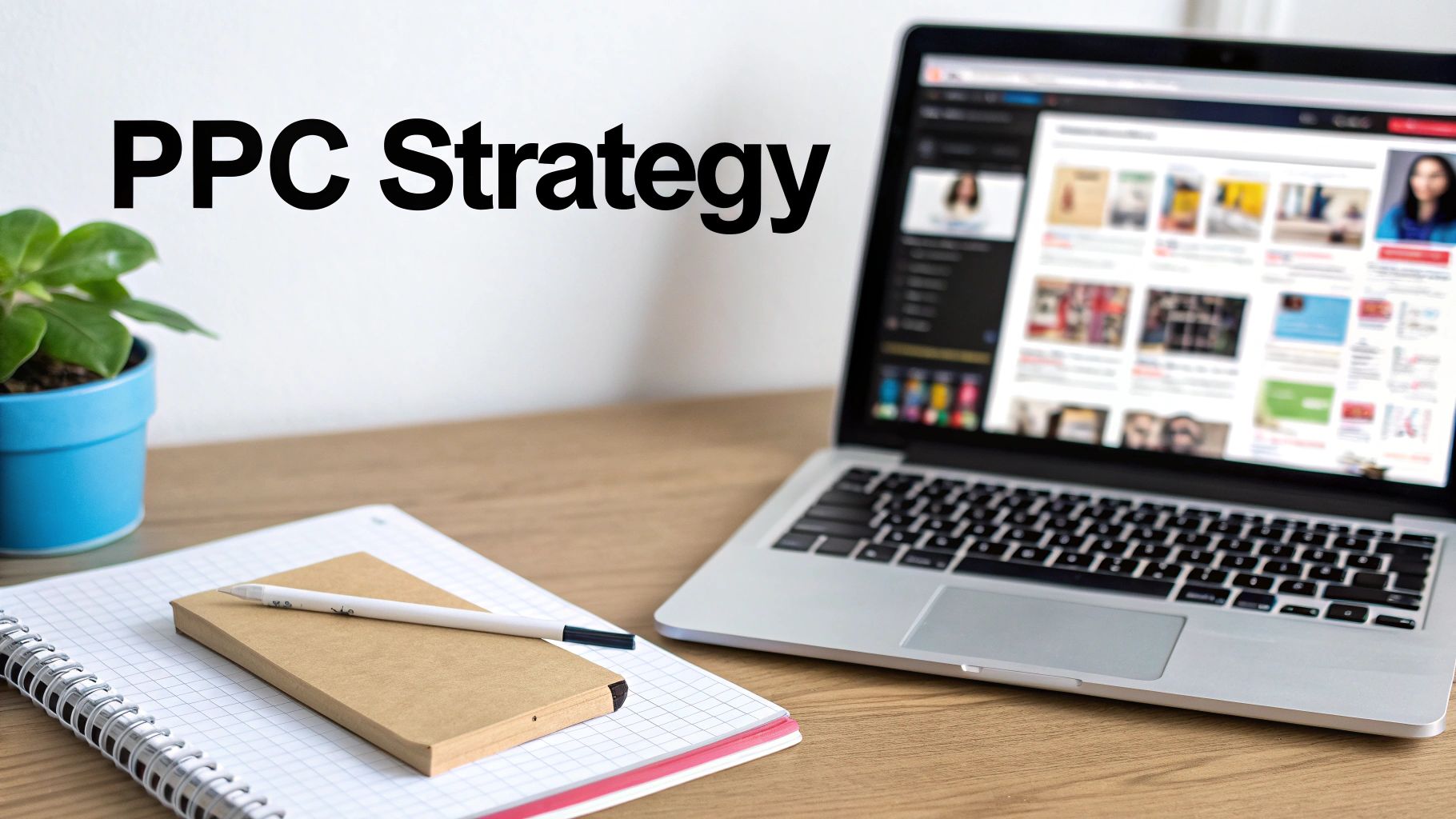
Uncovering Hidden Gold with Advanced Keyword Research
The foundation of any winning PPC campaign is getting the keywords right, but a specialist’s approach is totally different. It’s not about chasing broad, high-volume terms like "running shoes." That’s what lazy agencies do, and it’s like fishing with a giant net in the middle of the ocean—sure, you’ll catch something, but most of it will be junk that just drains your budget.
Instead, the real magic is in finding high-intent, long-tail keywords that signal someone is ready to pull out their wallet. Think phrases like "men's trail running shoes for wide feet" or "waterproof winter hiking boots sale." These searches have way less volume, but the conversion rates are often through the roof because you're catching people at the very end of their buying journey.
As an expert consultant, I dig deep into what your competitors are doing, sift through search query reports, and use powerful tools to find profitable niches that big, overloaded agencies almost always miss.
Crafting Ad Copy That Sells
Once you’ve found the right people, your ad copy is your 30-second sales pitch. Generic ads with boring headlines like "Shop Our Sale" just get scrolled past. As a specialist, I treat ad copy like a science, focusing on a direct-response approach that hits on specific customer pain points and gets them to act.
The goal is to answer their question before they even have to click.
Highlight Unique Selling Propositions (USPs): Do you offer free shipping? A lifetime warranty? Ethically sourced materials? I’ll get that front and center.
Create Urgency and Scarcity: Simple phrases like "Limited Stock" or "Sale Ends Friday" are classics for a reason—they work.
Speak Directly to the Search Query: If someone typed in "eco-friendly yoga mats," your ad headline better say something about "eco-friendly yoga mats." It sounds obvious, but this connection is key for relevance and a high Quality Score.
This isn’t just about getting a click. It’s about getting a click from a highly qualified person who is already leaning towards buying from you.
Strategic Campaign Structuring for Maximum Control
How your campaigns are organized is every bit as critical as the keywords and ads inside them. A classic agency mistake is just dumping hundreds of products into one or two giant campaigns. That approach makes it completely impossible to control your budget or get clean data on what’s actually working.
A consultant, on the other hand, builds a granular campaign structure that gives you total control and clarity. This usually means breaking things down by:
Product Category: "T-shirts" and "outerwear" shouldn’t be in the same bucket. They need different budgets and bidding strategies.
Profit Margin: You can afford to be much more aggressive with your ad spend on high-margin products.
Brand vs. Non-Brand: You have to separate searches for your own brand name from generic product searches to properly analyze performance.
This kind of meticulous organization is especially vital for Google Shopping. By structuring these visual campaigns the right way, I can ensure your most profitable products get the most visibility. To learn more, check out our guide on how to [optimize your Google Shopping product feed for better results](https://www.cometogether.media/single-post/optimize-your-google-shopping-product-feed-for-better-results).
An expert-led strategy is defined by precision. Every keyword, ad, and campaign is structured with intent, creating a feedback loop where clean data informs smarter decisions, driving down costs and pushing ROAS higher.
Meticulous Conversion Tracking to Prove ROI
At the end of the day, none of this matters if you can't measure the results accurately. As your consultant, I will ensure your conversion tracking is absolutely flawless, capturing not just the sales, but their exact revenue values. This is what allows you to calculate the single most important metric in e-commerce: Return on Ad Spend (ROAS).
This data-first approach is everything. After all, PPC traffic converts about 50% better than organic traffic. And when people are actively looking to buy, 65% click on ads. This high-intent behavior is exactly why precise tracking is non-negotiable—it’s how you capitalize on those ready-to-buy moments.
By focusing on these core pillars—deep keyword research, compelling copy, smart campaign structure, and perfect tracking—an independent consultant builds a high-performance PPC machine that consistently runs circles around the generic, one-size-fits-all approach of a bloated agency.
Using Data and AI to Amplify Your Results
Artificial intelligence and automation aren't just trendy buzzwords anymore; they are powerful forces completely reshaping how e-commerce ads are managed. But here’s the catch: these tools are only as smart as the strategist behind the keyboard.
In the right hands, AI is a force multiplier, amplifying an expert’s skill to new heights. In the wrong hands—like those of an overworked junior employee at a big agency—it becomes a crutch, a way to fake "management" across too many accounts.
This difference is one of the biggest dividing lines between a dedicated consultant and a large, bloated agency. I use technology to free up brainpower for high-level strategy, while they use it to juggle an overwhelming client load with a generic, hands-off template. For any brand serious about their ad spend, understanding this distinction is critical.
How a Specialist Wields AI for Your Benefit
A true specialist like myself treats AI like a highly skilled assistant, not a replacement for human intuition and experience. Think of AI as my co-pilot who can process thousands of data points and run complex calculations in the blink of an eye.
This frees up the human pilot—me—to focus on the bigger picture: navigating the overall strategy, spotting subtle market shifts, and making the creative calls that actually drive profitable growth.
This expert-led approach puts AI to work in a few key ways:
Sophisticated Bid Management: AI can analyze countless signals in real-time to set the perfect bid for every single auction. I guide this process, setting the right strategic goals (like maximizing ROAS) and establishing guardrails to ensure every automated action aligns with your business's real-world profitability.
Intelligent Audience Analysis: AI is brilliant at spotting patterns in customer data, uncovering new audience segments you'd likely never find manually. I then take these insights to sharpen your targeting and craft messaging that truly resonates.
Predictive Performance Modeling: By crunching historical data, AI can help forecast future trends. This lets a specialist get ahead of seasonal shifts or market changes, proactively adjusting your budget and strategy for maximum impact.
The goal isn’t to “set it and forget it.” It’s about creating a powerful feedback loop where AI provides the data-driven insights and I provide the strategic direction and creative spark. This combination is what unlocks game-changing performance in ecommerce PPC services.
The Agency Crutch: AI as a Substitute for Strategy
On the other side of the coin, you have large, volume-focused agencies that often use automation as a crutch. Overloaded with dozens, or even hundreds, of clients, they simply don't have the bandwidth for deep, individual account management.
For them, automation isn't a tool to enhance strategy; it’s a way to put accounts on autopilot.
This approach inevitably leads to generic, cookie-cutter campaigns. The AI is given broad, surface-level goals, and there's no expert strategist fine-tuning its performance based on your unique profit margins, customer lifetime value, or competitive pressures. The result? Wasted ad spend on campaigns that look busy but fail to deliver meaningful profit.
The rise of AI in e-commerce PPC is undeniable. Global AI marketing investment is projected to hit $47 billion by the end of 2025, proving that technology is central to modern advertising. While businesses typically see around $2 in revenue for every $1 spent on PPC, expertly managed campaigns can drive returns as high as 800%—a testament to the power of expert-guided automation. You can read more about the rise of AI in top PPC agencies on Insidea.com.
Ultimately, AI is a tool. In the hands of a master carpenter, a power saw can create a beautiful piece of furniture. In the hands of a novice, that same tool just makes a lot of sawdust.
By choosing a dedicated consultant, you're not just hiring someone to manage campaigns. You're hiring a master strategist who knows how to wield the most advanced tools to build something profitable and lasting for your brand.
Measuring True ROI Beyond Clicks and Impressions
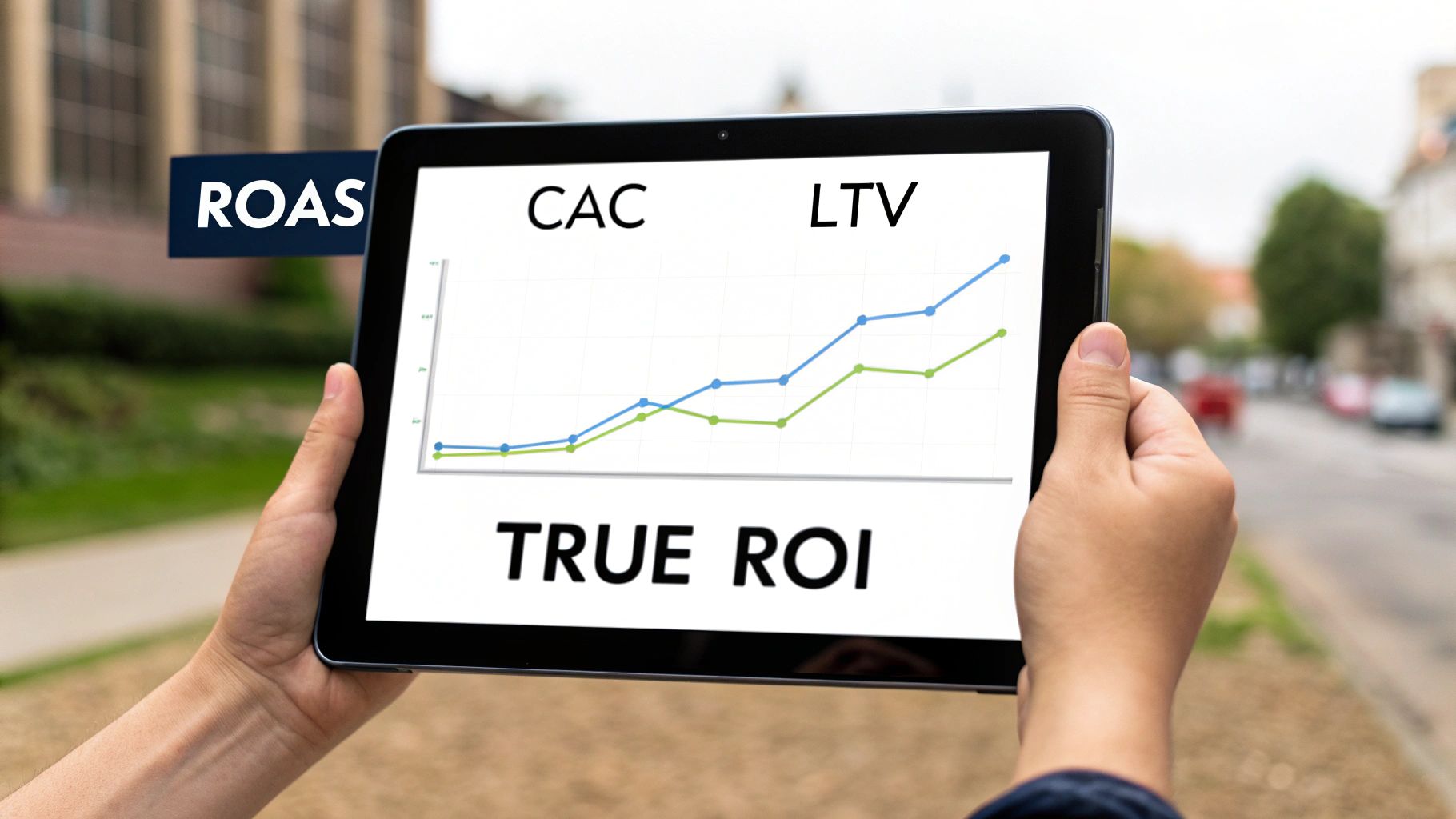
In the world of e-commerce PPC, clicks and impressions are just noise. They might make a report look busy, but they don't pay the bills. A bloated agency can easily point to a high click-through rate to justify their hefty fees, but a true expert knows the only numbers that matter are the ones tied directly to your profitability.
This is a core difference in philosophy. As an independent consultant, my success is tied directly to your bottom line. I have no incentive to chase vanity metrics; my entire focus shifts to delivering a clear, measurable return on your investment.
You aren’t paying for layers of management or a fancy downtown office. You're investing in a strategic partner who lives and breathes the data that defines your store's success.
Moving Beyond Vanity Metrics
Let's be clear: the cheapest PPC option is almost never the most profitable one. A low-cost, high-volume agency might get you a ton of clicks, but if those clicks don’t convert into profitable sales, you're just lighting money on fire.
A specialist, on the other hand, changes the conversation entirely by focusing on the three pillars of real e-commerce growth.
Return on Ad Spend (ROAS): This is the ultimate benchmark. For every dollar you put into ads, how many dollars in revenue are you getting back? As your consultant, I obsess over maximizing this number.
Customer Acquisition Cost (CAC): How much does it actually cost to get a new customer? An expert works to drive this number down by targeting the right people with the right message, eliminating wasted spend.
Lifetime Value (LTV): A single purchase is good. A loyal, repeat customer is gold. A smart PPC strategy targets customers who are more likely to have a higher LTV, building sustainable growth for your brand.
An expert consultant doesn't just manage your ads; they manage your profitability. By optimizing for ROAS, CAC, and LTV, they build a growth engine that delivers far greater long-term value than any low-cost, low-impact agency ever could.
This strategic approach is only becoming more critical. The e-commerce PPC services market is projected to skyrocket from $15 billion in 2025 to $45 billion by 2033, fueled by businesses that are tired of vanity metrics and demand real results.
The Real Cost of Inexperience
Investing in a true expert who can masterfully balance these core metrics is an investment in sustainable growth. They have the experience to know which levers to pull to not only drive sales today but also attract customers who will keep coming back for more. For a detailed breakdown of this vital metric, read our consultant's guide to calculating your Return on Ad Spend.
Beyond simply tracking clicks, true PPC ROI is deeply tied to how effectively traffic converts into sales once it hits your site. This makes a focus on improving e-commerce conversion rates absolutely critical for success.
Choosing an expert consultant over a cheap agency isn't about spending more; it's about investing smarter. You are paying for a level of strategic insight that turns your ad budget from a simple expense into a powerful, predictable revenue generator for your business.
How to Choose the Right PPC Partner for Your Brand
Picking the right partner to run your e-commerce PPC is one of the biggest calls you’ll make for your brand’s growth. The market is flooded with options—from giant, full-service agencies to solo, specialized consultants like me. Your choice doesn't just affect ad performance; it hits your bottom line and your peace of mind.
The key is to cut through the noise and find a real partner, someone whose success is tied directly to yours.
Big agencies can be impressive, with their long client lists and massive teams, but that model often hides some serious downsides. It’s common to get sold by a senior strategist only to be handed off to a junior account manager juggling a dozen other clients. That classic "bait-and-switch" is a huge problem in this industry.
Questions to Ask a Potential Partner
To figure out who’s the real deal, you have to ask the right questions. Don't think of it as hiring a vendor; you're interviewing a key member of your growth team. Their answers will tell you everything you need to know about their approach and expertise.
Here’s a quick checklist for your conversation:
"Who, specifically, will be managing my account day-to-day?" This is the most important question you can ask. You need direct access to the expert doing the actual work, not a project manager acting as a go-between.
"Can you share case studies or results from e-commerce brands similar to mine?" General experience is fine, but you want proof they’ve succeeded in your niche.
"What's your strategic philosophy for a brand at my stage of growth?" A great partner will give you a thoughtful, custom answer, not some generic, one-size-fits-all pitch.
"How do you handle communication and reporting?" You’re looking for a partner who delivers clear, actionable insights focused on ROAS and CAC—not just a data dump of clicks and impressions.
The goal is to find an expert who thinks like a business owner, not just an ad manager. They should be obsessed with your profit margins, customer acquisition costs, and long-term value—the metrics that actually define success.
Red Flags to Watch For
Knowing what to avoid is just as important as knowing what to look for. Certain red flags are immediate signals that a potential partner doesn’t have your best interests at heart. Bloated agencies, in particular, often use tactics that protect their own scalability, not your profitability.
Keep an eye out for these warning signs:
Unrealistic Guarantees: Anyone promising a specific ROAS or "instant #1 rankings" is selling snake oil. Real PPC is all about methodical testing and data-driven optimization. There are no shortcuts.
Vague Strategic Plans: If they can't clearly articulate their initial 90-day plan and how they'll approach your account, they're probably just going to plug you into a template.
The Bait-and-Switch: If the expert on the sales call isn't the person you'll be working with, just walk away. It's a classic agency move to hide inexperienced, overworked junior staff behind their senior talent.
Choosing a dedicated expert over a bloated agency means your money is going toward strategic thinking, not expensive overhead and fancy office space. By asking sharp questions and spotting the red flags, you can find a partner who is genuinely committed to building a profitable, sustainable growth engine for your brand.
Common Questions About Ecommerce PPC
I get it. Diving into the world of ecommerce PPC services can feel like a big step, and you’ve probably got a few questions. Let's tackle the most common ones I hear from business owners, especially when they're weighing the benefits of working with a focused consultant versus a big, faceless agency.
How Long Until I See Results?
This is the big one, right? While every account has its own quirks, you should start seeing real data and initial traction within the first 30 to 60 days.
The first few weeks are all about setup, deep-dive strategy, and letting the data roll in. By the second month, we’ll have enough performance history to start making smart, strategic tweaks that begin pushing your Return on Ad Spend (ROAS) in the right direction.
Unlike bloated agencies where things can get stuck in committee for months, a dedicated consultant can be nimble. This agile approach means we can make quick, data-backed pivots to get your budget working harder for you, faster.
What Is a Realistic Starting Budget?
There’s no magic number, but for a serious e-commerce brand, a realistic starting point for ad spend is usually in the ballpark of $3,000 to $5,000 per month.
Why that much? Because it gives us enough fuel to gather data across different campaigns and make decisions that are actually statistically significant. If you start too small, you can starve the campaigns of the very data we need to optimize them effectively.
My goal isn't just to spend your budget; it's to prove its profitability. We begin with a focused budget to validate the strategy. Once we have a clear, data-backed path to a positive ROAS, we can scale up aggressively and confidently.
How Is Communication Different with a Consultant?
Communication is probably the single biggest difference. In large agencies, you're often filtered through a junior account manager who acts as a go-between, relaying messages to the person actually doing the work. This creates delays, misinterpretations, and a whole lot of frustration.
When you partner directly with an independent consultant like me, the whole dynamic changes. You get:
Direct Access: You’re talking straight to the expert who lives and breathes your campaigns. No middlemen.
Faster Responses: Questions get answered and strategic discussions happen in real-time, without the bureaucratic runaround.
Proactive Insights: You’ll get clear, straightforward reports that explain what the data actually means for your business—not just a confusing data dump that leaves you guessing.
This direct, transparent partnership keeps your campaigns perfectly aligned with your business goals, minus all the friction and bloat of the old agency model. It’s a massive advantage when picking your ecommerce PPC services provider.
Ready to see what a dedicated, expert-led PPC strategy can do for your e-commerce brand? Come Together Media LLC offers a one-on-one partnership focused on maximizing your profitability, not our client list. Book your free consultation today and get a no-commitment review of your account.




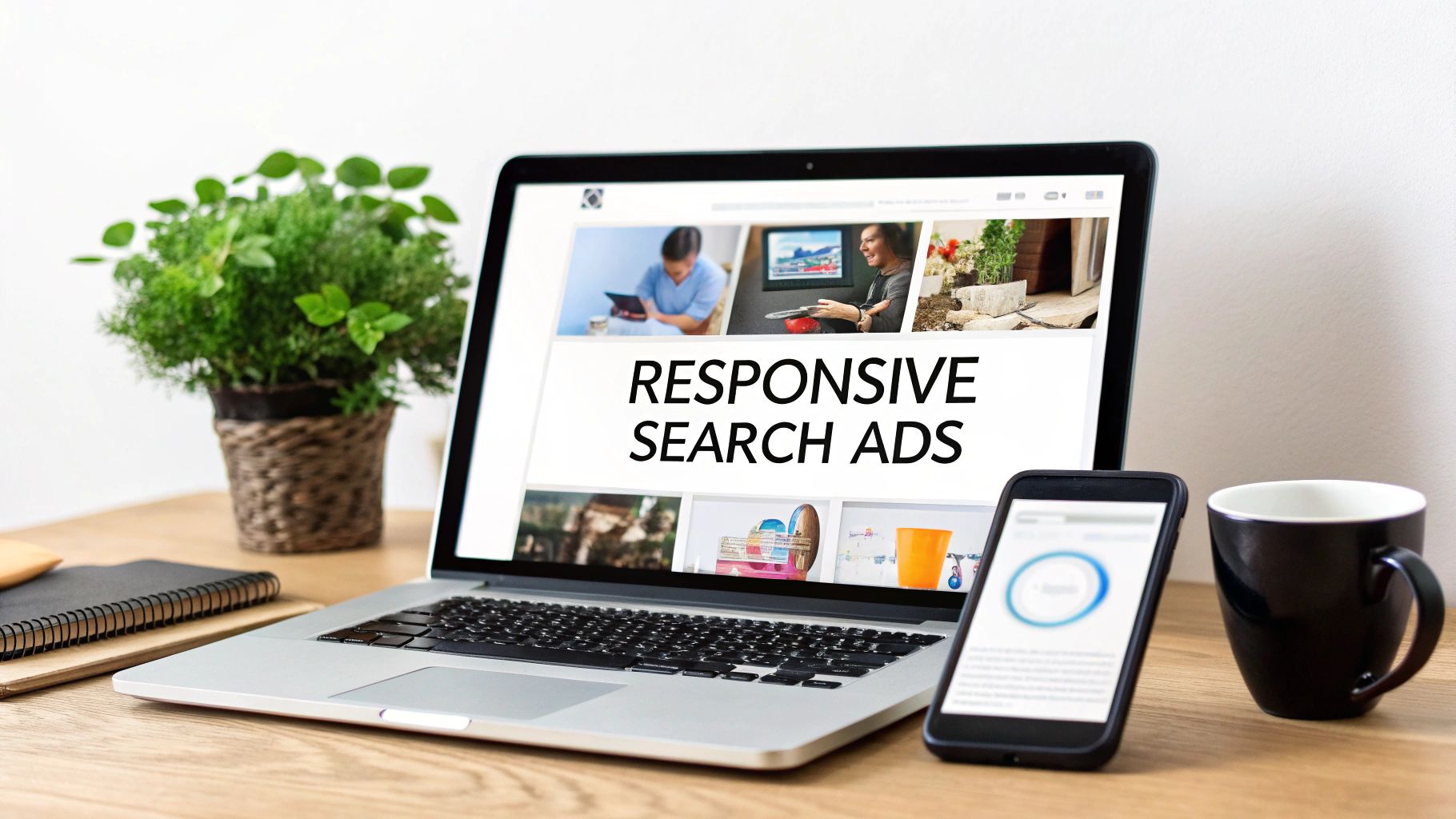
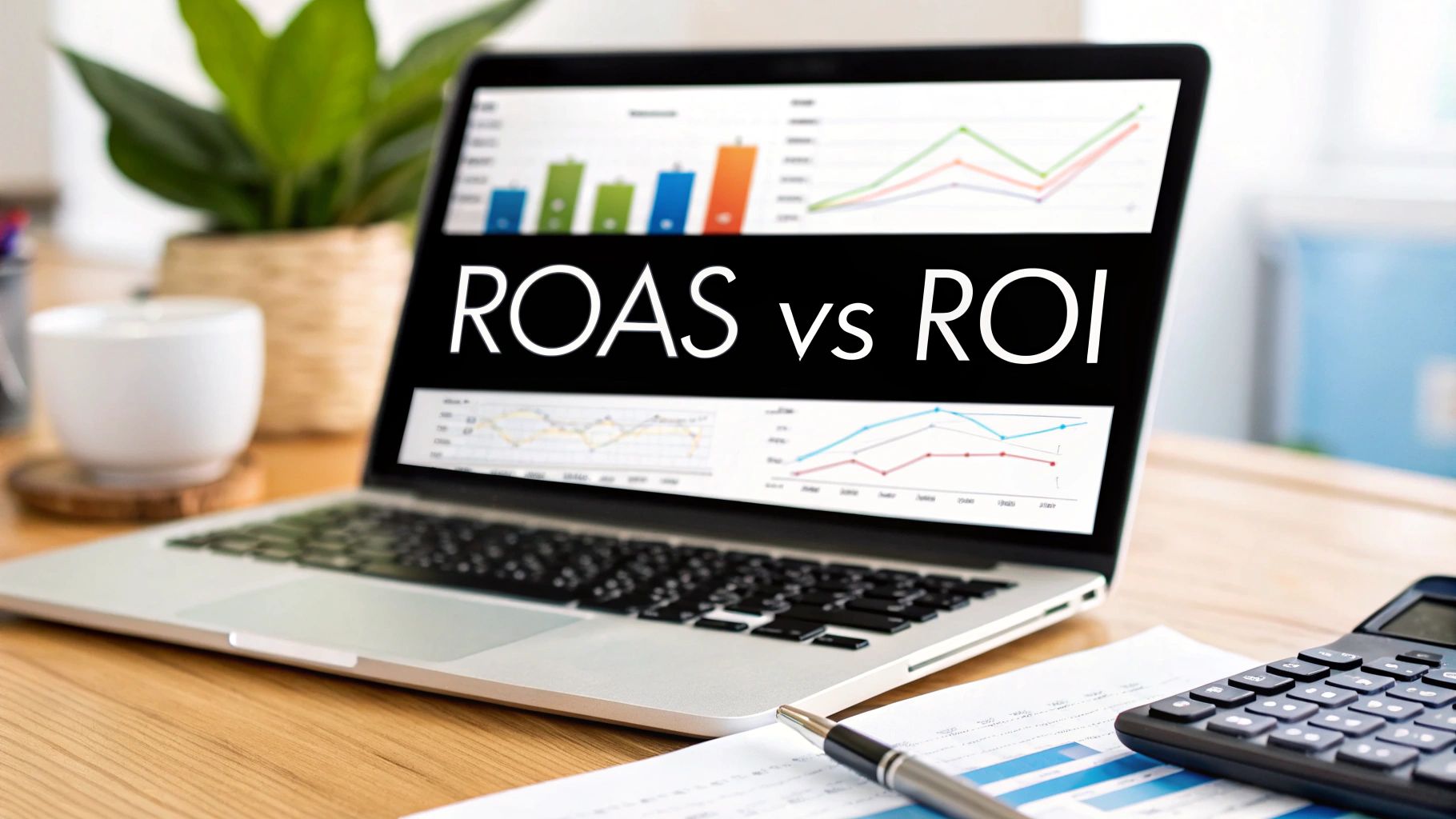
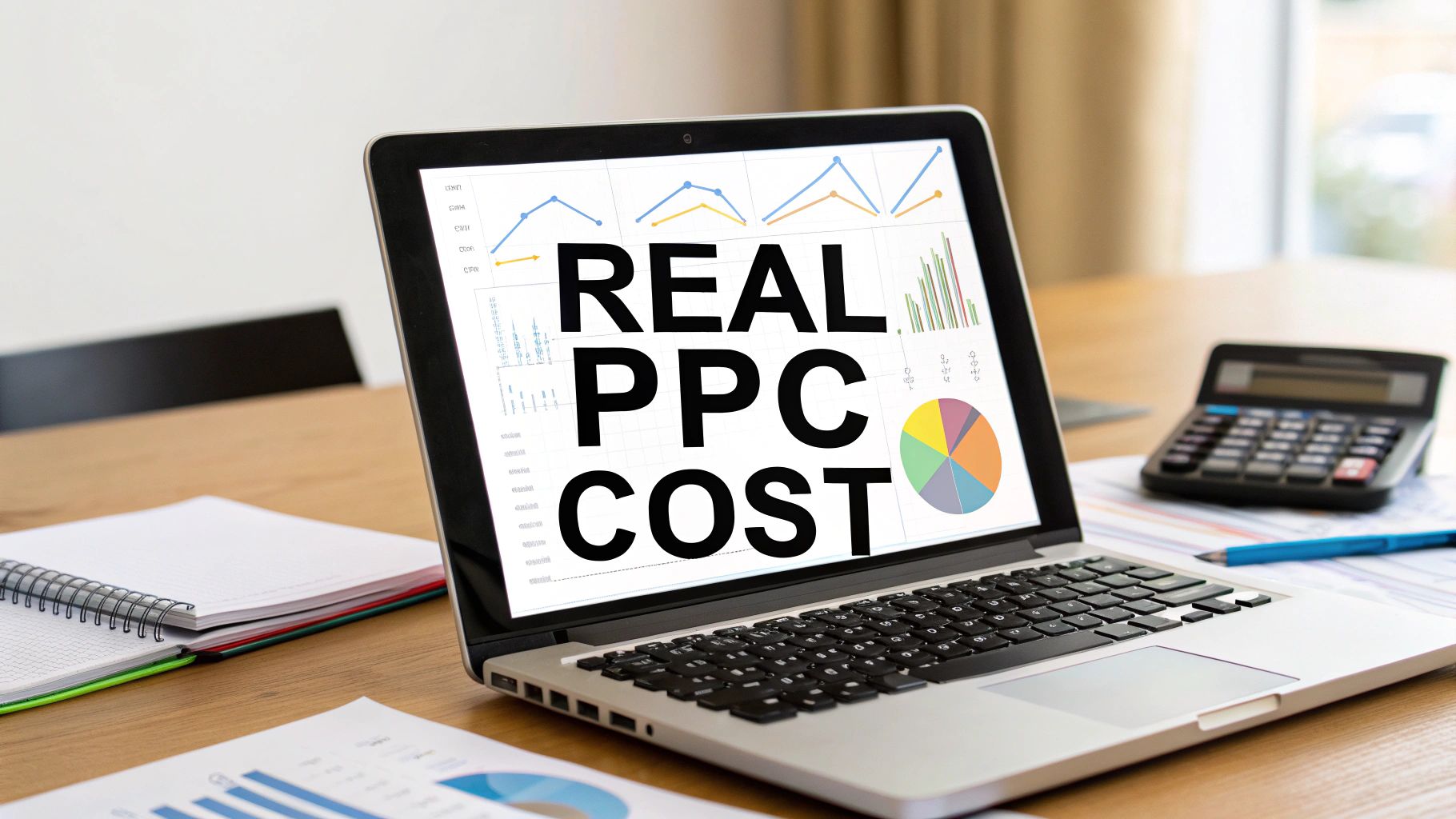
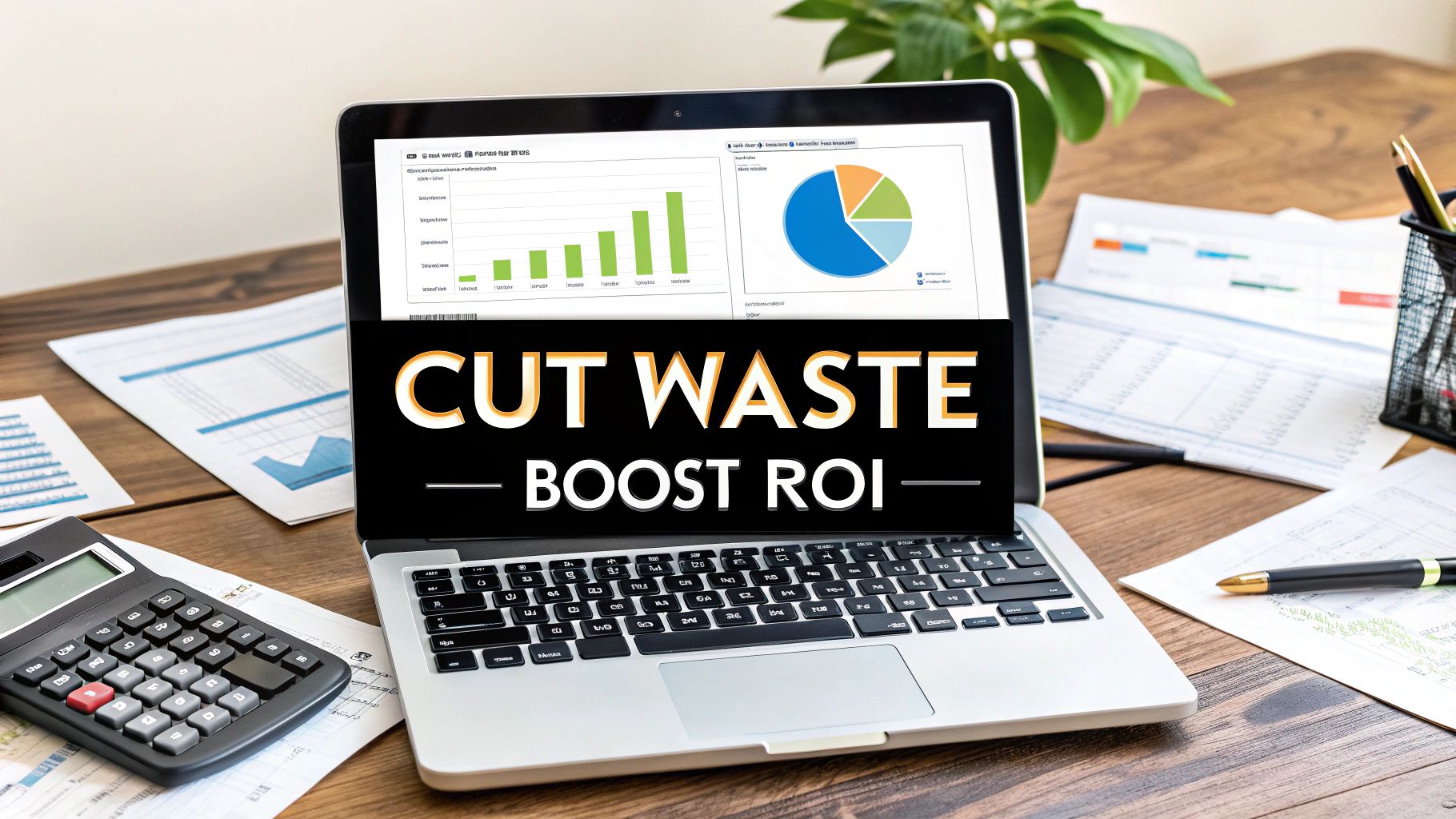
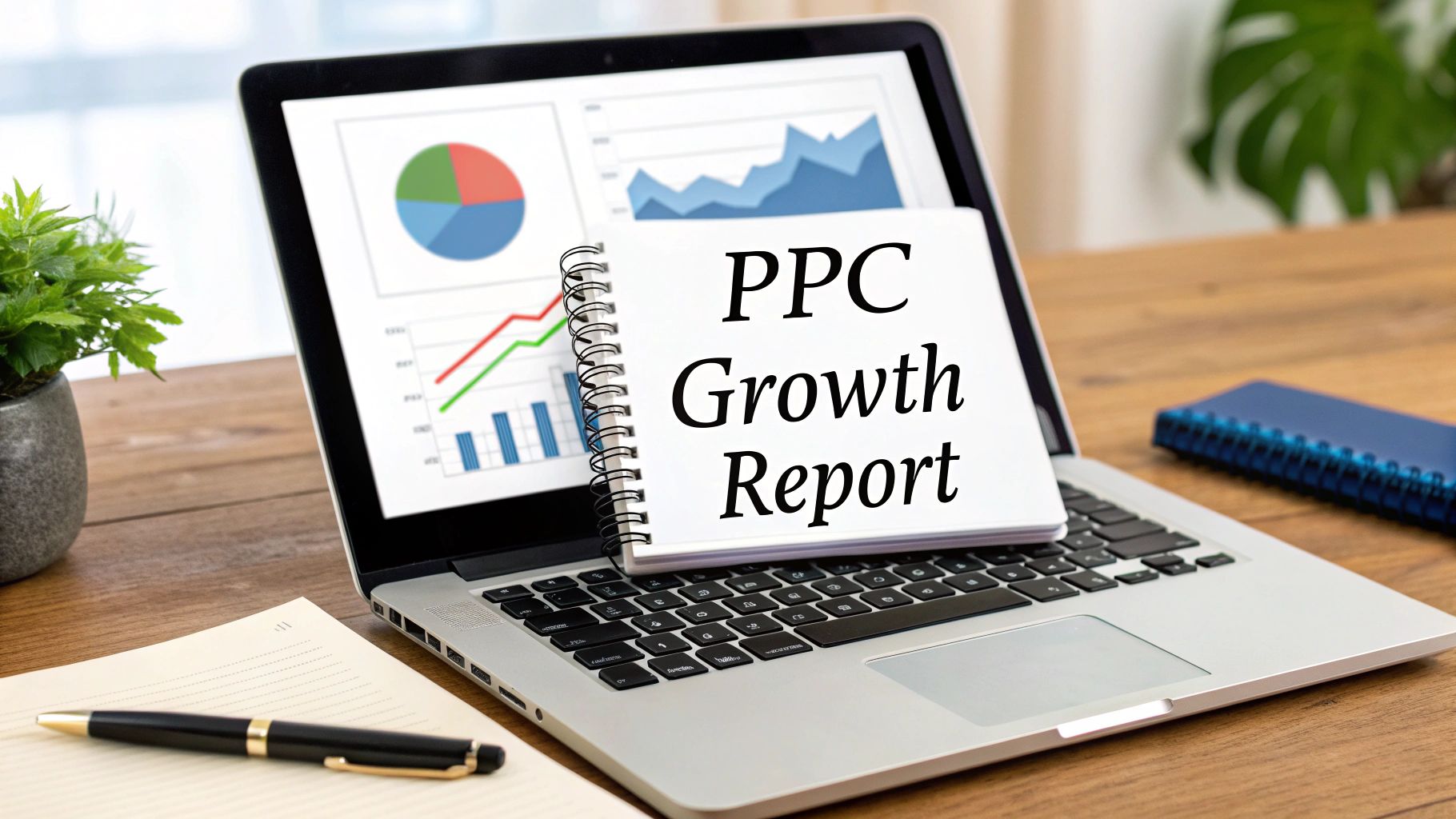
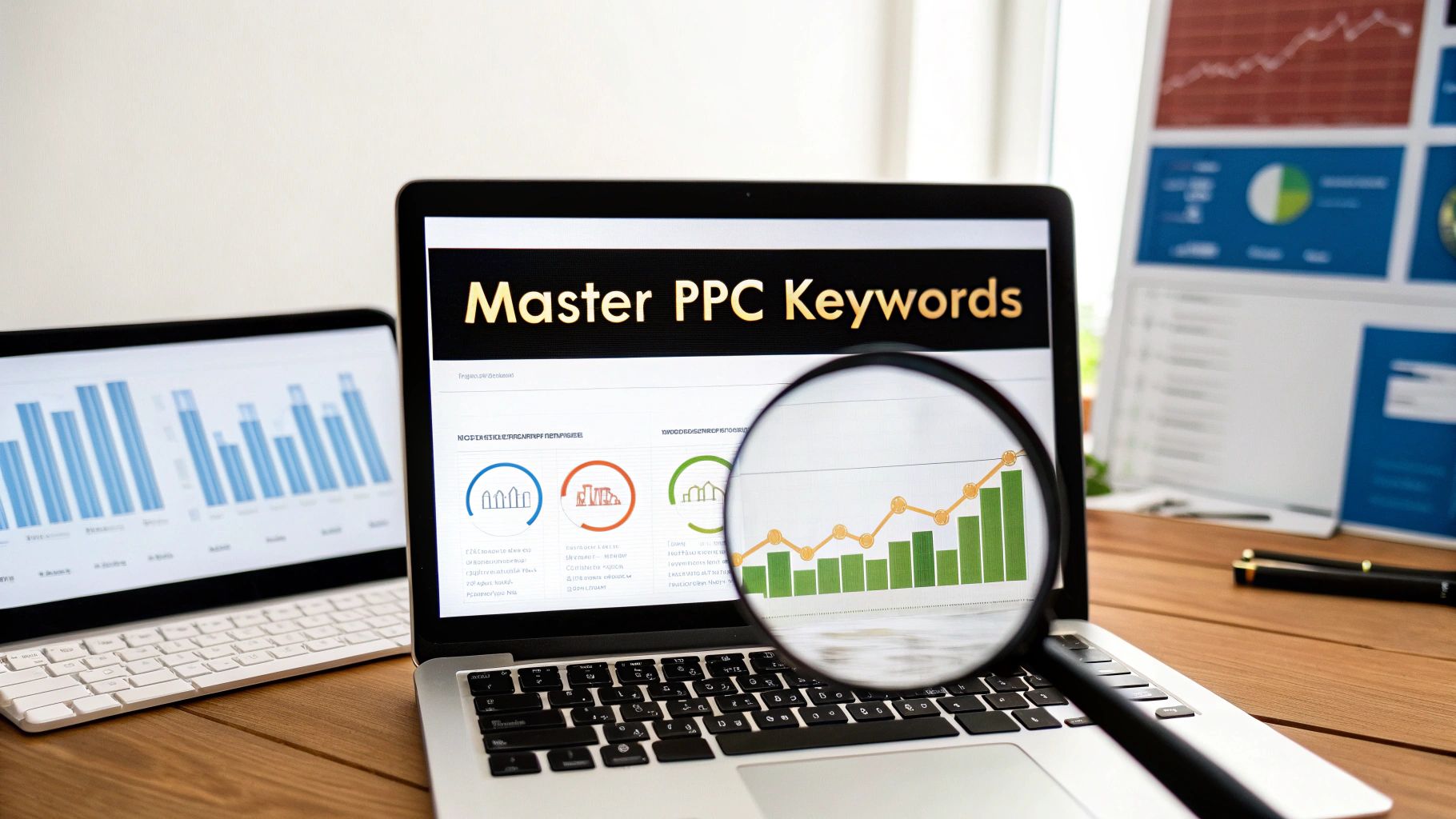
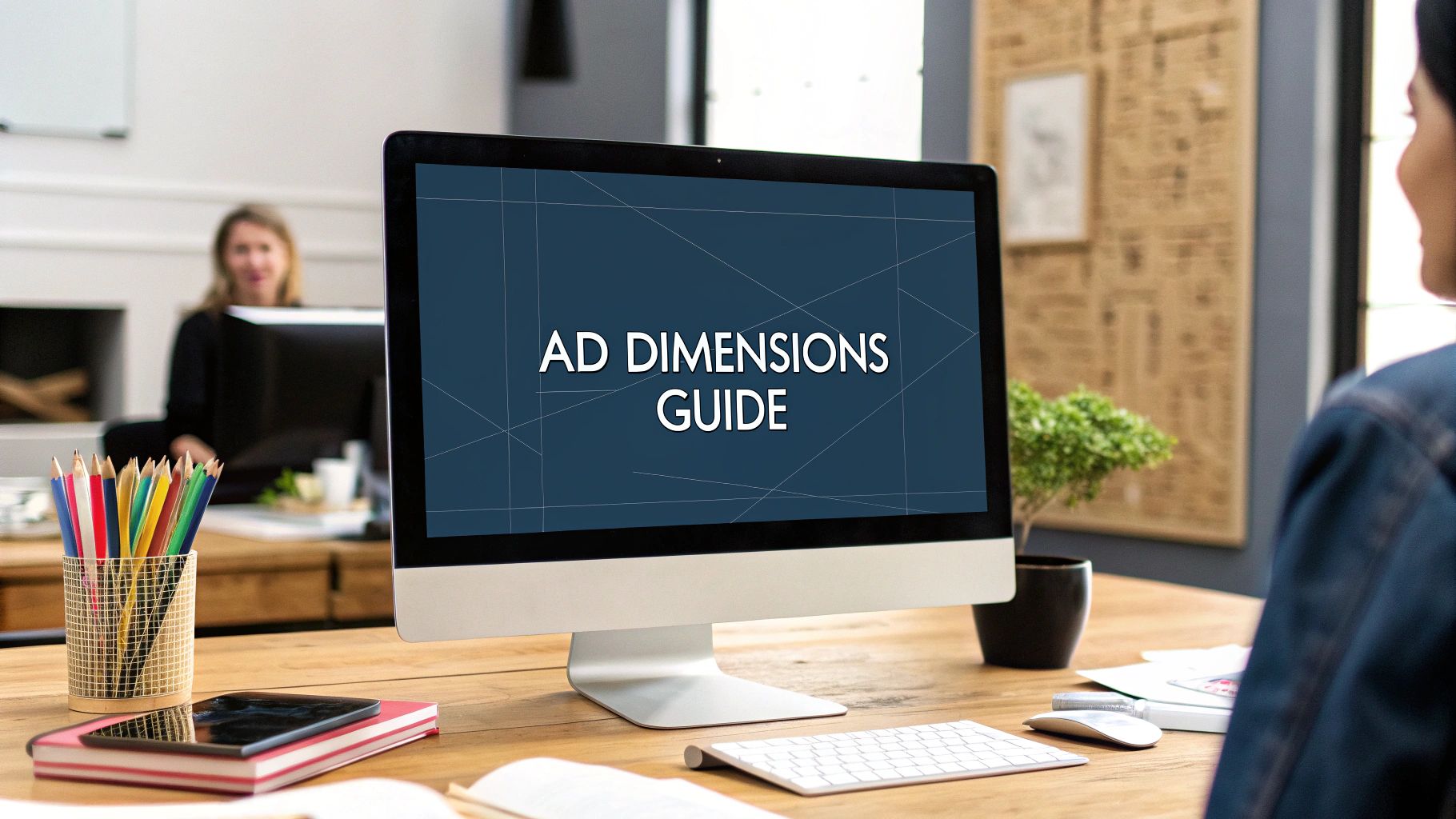
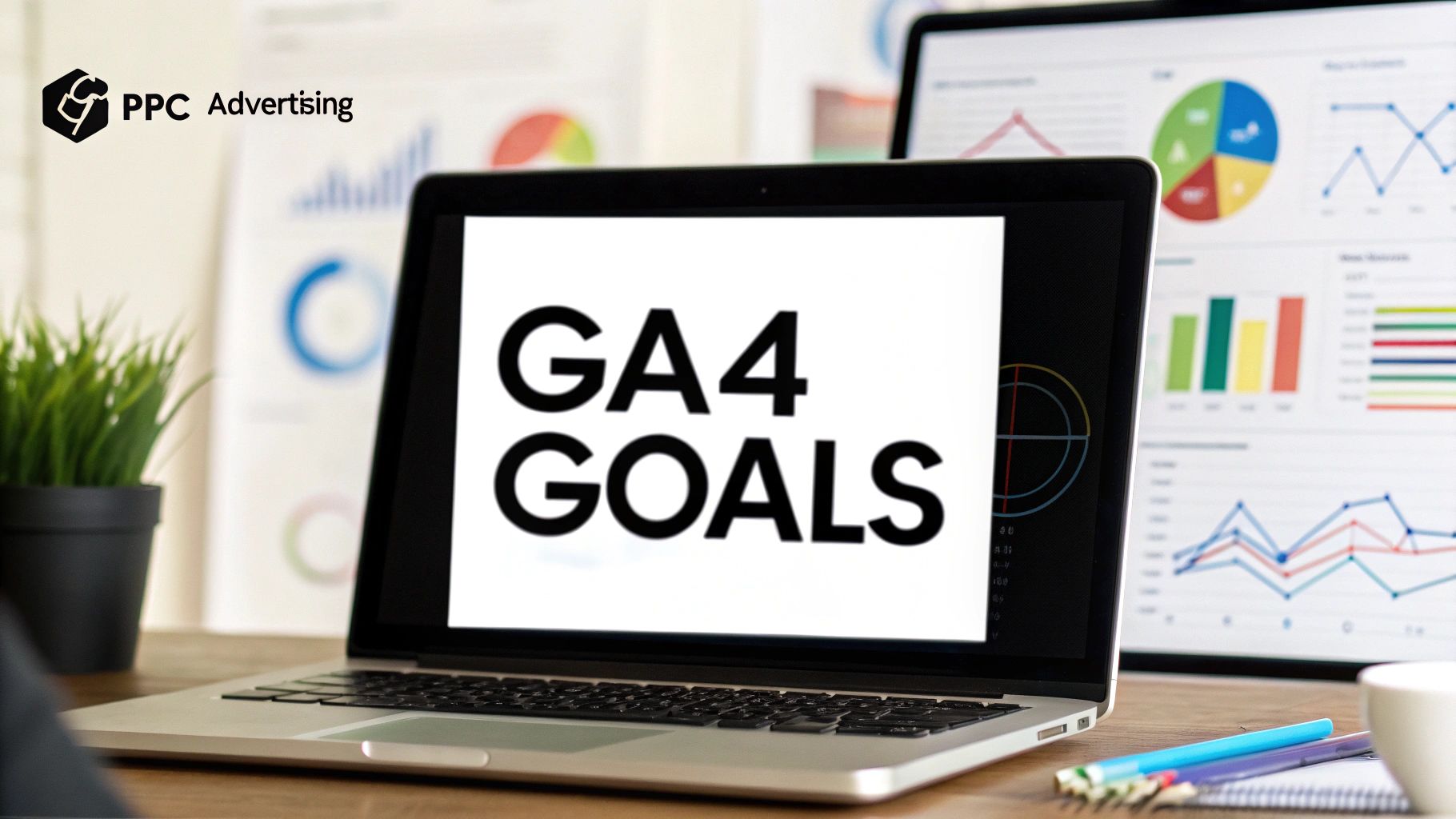
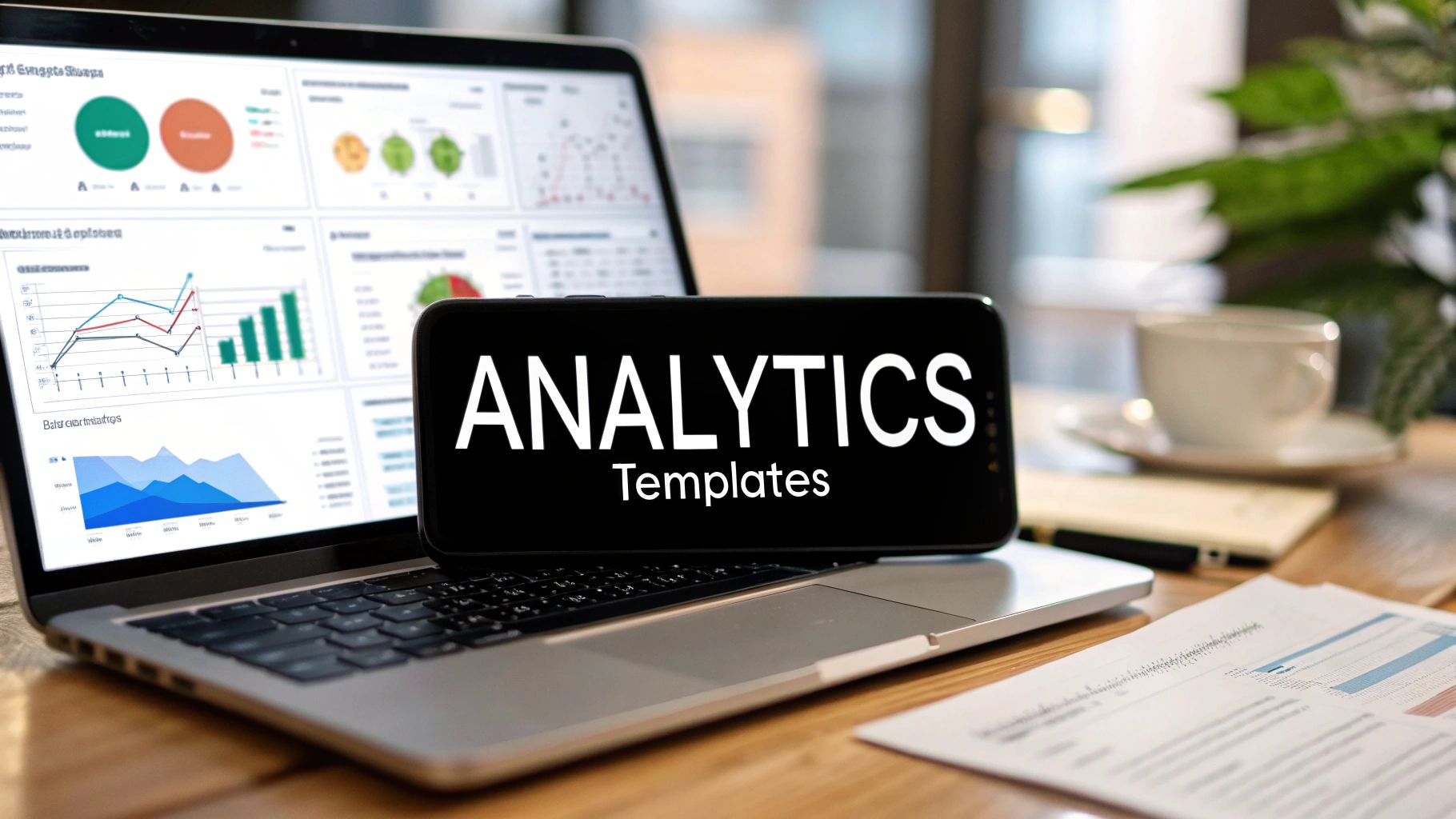
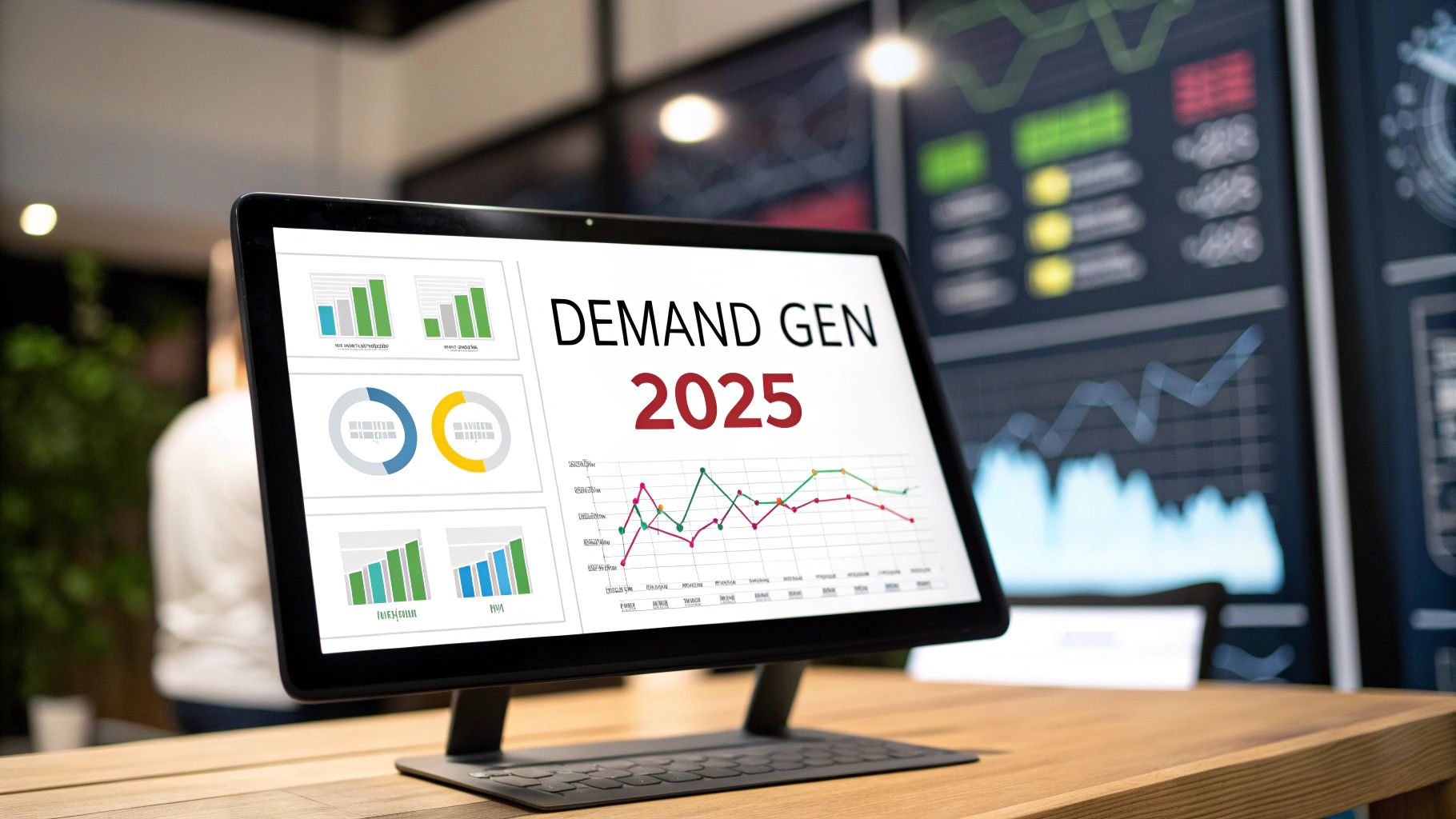
Comments